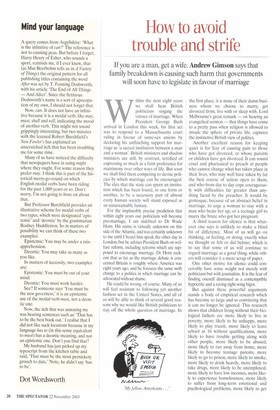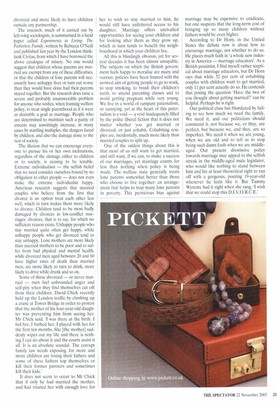How to avoid trouble and strife
If you are a man, get a wife. Andrew Gimson says that family breakdown is causing such harm that governments will soon have to legislate in favour of marriage Ivithin the next eight years we shall hear British politicians singing the virtues of marriage. When President George Bush arrived in London this week, his first act was to respond to a Massachusetts court ruling in favour of same-sex unions by declaring his unflinching support for marriage as 'a sacred institution between a man and a woman'. British ministers and shadow ministers are still, by contrast, terrified of expressing so much as a faint preference for matrimony over other ways of life. But soon we shall find them competing to devise policies by which marriage can be encouraged. The idea that the state can spurn an institution which has been found, in one form or another, to be a necessary part of almost every human society will stand exposed as an unsustainable fantasy.
For the implausibly precise prediction that within eight years our politicians will become pro-marriage, I am indebted to Dr Wade Horn. His name is virtually unknown on this side of the Atlantic, and was certainly unknown to me until I heard him speak the other day in London, but he advises President Bush on welfare reform, including reforms which are supposed to encourage marriage. Dr Horn reckons that as far as the marriage debate is concerned Britain is roughly where America was eight years ago, and he foresees the same swift change to a politics in which marriage can be advocated without shame.
He could be wrong, of course. Many of us will feel resistant to following yet another fashion set in the United States, and all of us will be able to think of several good reasons why we would like British politicians to stay off the whole question of marriage. In the first place, it is none of their damn business whom we choose to marry, get divorced from, live with or sleep with. Lord Melbourne's great remark — on hearing an evangelical sermon — that things have come to a pretty pass when religion is allowed to invade the sphere of private life, captures the instinctive British view of politics.
Another excellent reason for keeping quiet is for fear of causing pain to those who have got divorced, or whose parents or children have got divorced. It can sound cruel and pharisaical to preach at people who cannot change what has taken place in their lives, who may well have taken by far the best course of action open to them, and who from day to day cope courageously with difficulties far greater than anything faced by the preacher. It would be grotesque, because of an abstract belief in marriage, to urge a woman to stay with a man who beats her up, or a teenage girl to many the brute who got her pregnant.
A third reason for silence is that whatever one says is unlikely to make a blind bit of difference. Most of us will go on thinking, or feeling, or doing, exactly what we thought or felt or did before; which is to say that some of us will continue to regard marriage as a good thing, while others will consider it a mere scrap of paper.
One other motive for silence could conceivably have some weight not merely with politicians but with journalists. It is the fear of finding oneself dismissed as a contemptible hypocrite and a raving right-wing bigot.
But against these powerful arguments stands a body of empirical research which has become so large and so convincing that it can no longer be ignored. This research shows that children living without their biological fathers are more likely to live in poverty, more likely to be unhappy, more likely to play truant, more likely to leave school at 16 without qualifications, more likely to have trouble getting along with other people, more likely to be abused, more likely to run away from home, more likely to become teenage parents, more likely to go to prison, more likely to smoke, more likely to drink heavily, more likely to take drugs, more likely to be unemployed, more likely to have low incomes, more likely to experience homelessness, more likely to suffer from long-term emotional and psychological problems, more likely to get divorced and more likely to have children outside any partnership.
The research, much of it carried out by left-wing sociologists, is summarised in a lucid paper called Experiments in Living: The Fatherless Family, written by Rebecca O'Neill and published last year by the London thinktank Civitas, from which I have borrowed the above catalogue of misery. No one would suggest that children whose parents are married are exempt from any of these difficulties, or that the children of lone parents will necessarily have unhappy lives or turn out worse than they would have done had their parents stayed together. But the research does raise a severe and probably unanswerable problem for anyone who wishes, when framing welfare policy, to treat single parenthood as if it were as desirable a goal as marriage. People who are determined to maintain such a parity of esteem may unwittingly increase, in many cases by startling multiples, the dangers faced by children, and also the damage done to the rest of society.
The illusion that we can encourage everyone to pursue his or her own inclinations, regardless of the damage either to children or to society, is ceasing to be tenable. Extreme individualism — the selfish belief that we need consider ourselves bound by no obligation to other people — does not even make the extreme individualist happy. American research suggests that married couples who believe from the first that divorce is an option treat each other less well, which in turn makes them more likely to divorce. Children tend to be most badly damaged by divorces in low-conflict marriages: divorces, that is to say, for which no sufficient reason exists. Unhappy people who stay married quite often get happy, while unhappy people who get divorced tend to stay unhappy. Lone mothers are more likely than married mothers to be poor and to suffer from bad physical and mental health, while divorced men aged between 20 and 60 have higher rates of death than married men, are more likely to turn to drink, more likely to drive while drunk and so on.
Some of these divorced — or never married — men feel unbounded anger and self-pity when they find themselves cut off from their children. David Chick recently held up the London traffic by climbing up a crane at Tower Bridge in order to protest that the mother of his four-year-old daughter was preventing him from seeing her. Mr Chick said, 'I was there at the birth. I fed her, I bathed her, I played with her for the first ten months. She [the mother] suddenly wipes out my life and there is nothing I can do about it and the courts assist it all. It is an absolute scandal. The corrupt family law needs exposing, for more and more children are losing their fathers and some of these fathers top themselves or kill their former partners and sometimes kill their kids.'
It does not seem to occur to Mr Chick that if only he had married the mother, and had treated her with enough love for her to wish to stay married to him, he would still have unfettered access to his daughter. Marriage offers unrivalled opportunities for seeing your children and for looking after them as they grow up, which in turn tends to benefit the neighbourhood in which your children live.
All this is blindingly obvious, yet for several decades it has been almost unsayable. The subjects on which the British government feels happy to moralise are many and various: policies have been framed with the avowed aim of getting people to go to work, to stop smoking, to brush their children's teeth, to attend parenting classes and to avoid getting pregnant while very young. We live in a world of rampant paternalism, or nannying, yet at the heart of this paternalism is a void — a void inadequately filled by the polite liberal fiction that it does not matter whether you get married or divorced, or just cohabit. Cohabiting couples are, incidentally, much more likely than married couples to split up.
One of the oddest things about this is that most of us still want to get married, and still want, if we can, to make a success of our marriages, yet marriage counts for less than nothing when policy is being made. The welfare state generally treats lone parents somewhat better than those who choose to live together: an arrangement that helps to trap many lone parents in poverty. This pernicious bias against marriage may be expensive to eradicate, but one suspects that the long-term cost of bringing up so many children without fathers would be even higher.
According to Dr Horn, in the United States the debate now is about how to encourage marriage, not whether to do so. He places much faith in 'a whole new industry in America — marriage educators'. As a British pessimist, I find myself rather sceptical about marriage educators, but Dr Horn says that while 52 per cent of cohabiting couples with children want to get married, only 11 per cent actually do so. He contends that posing the question 'Have the two of you thought about getting married?' can be helpful. Perhaps he is right.
Our political class has blundered by failing to see how much we need the family. We need it, and our politicians should commend it, not because we, or they, are perfect, but because we, and they, are so imperfect. We need it when we are young, when we are old and to tell us to stop being such damn fools when we are middleaged. Our present dismissive policy towards marriage may appeal to the selfish streak in the middle-aged male legislator, who would like nothing to stand between him and his at least theoretical right to run off with a gorgeous, pouting 19-year-old whenever he feels like it. But Tammy Wynette had it right when she sang, 'I wish that we could stop this D.I.V.O.R.C.E.'



























































































 Previous page
Previous page